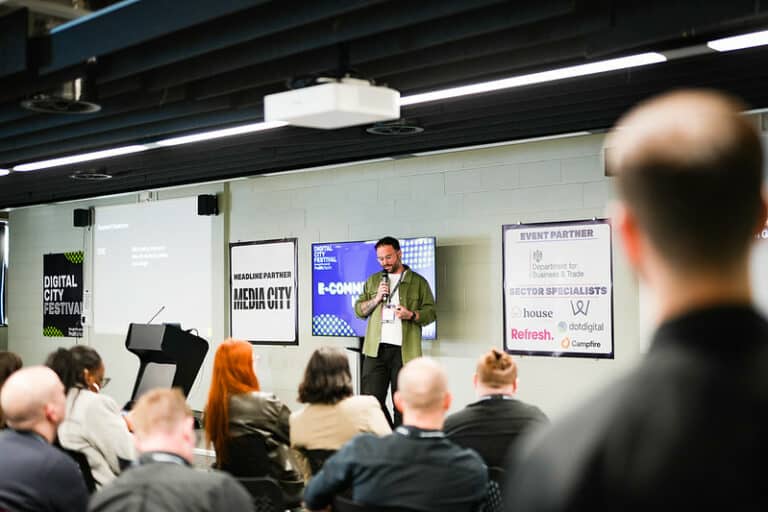Marketing and brand leaders came together for Digital City Festival’s E-Commerce Show North event, featuring speakers from the likes of Jaywing, Campfire, Department for Business and Trade and more.
Featuring insightful talks, practical tips and the latest trends in the ecommerce world, E-commerce Show North was hosted at UA92 on Wednesday 17 April.
The event kicked off exploring the dynamic shifts rocking the media landscape for e-commerce brands right now with Chris Dowse, Integrated Strategy Director at Jaywing. He shared the importance of integrating data, media, and creative elements whilst showcasing how brands can reach new and engaged customers profitably.
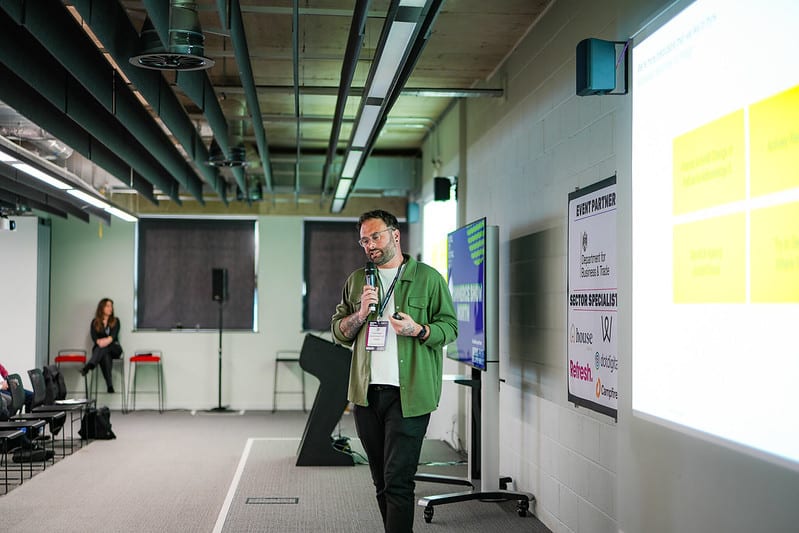
Following an overview of the changing online sales landscape over the decades, he addressed AI from an ecommerce point of view. AI can improve efficiency around creating product descriptions en masse, as an example, but those using AI need to think “carefully” about what it’s replacing and how it’s used.
First party data is becoming “more and more important”. He emphasised there’s “huge opportunities” with it but you need to get the basics right first, as there’s no point collecting data if it’s not being used correctly. Other shifts rocking the media landscape for ecommerce brands include the rollout of SGE internationally, which he said will be interesting to see how it develops but it’s not all “doom and gloom”.
Preparing for a cookieless future that’s “fast approaching” needs to be taken seriously by ecommerce brands too, as is embracing personalisation. By combining personalisation with experiences on ecommerce platforms, along with first party data, is where brands can see “big opportunities”.
He set out three key shifts to win in 2024: mindset, integration and customer-first. Brands “should follow customers first” and need to be confident to move into new territories and spaces if they’re to continue to “thrive” too.
Digital communities, digital memberships and squad shopping are further opportunities for ecommerce brands to grow as is TikTok Shop, despite some being “weary and sceptical” on how you can sell things so cheaply. TikTok Search is also a dynamic shift with 40% of Gen Z reporting they prefer TikTok or Instagram when searching for recommendations.
Marius Platt, Head of Paid Media at Campfire, took to the stage next to showcase how brands can maximise social media content for customer engagement.

Setting out how social media can be “really impactful” to reach and engage with audiences to build trust and authority, he said over 26.7% of social media users use various platforms to find things to do or things to purchase.
Consider different formats and tailoring creative or products in a more sales-focused way when it comes to ads on social media. As attention spans are getting shorter, especially with Gen Z’s attention span around 1.3 seconds, he explained how having a solid ad creative is “key”.
Branding is now “more important than ever”, he added, pointing to how Patagonia has a clear brand purpose, authenticity and quality. There’s now a real importance on brand identity in 2024 as consumers are “more savvy than ever” and demanding authenticity so his advice was to ensure brands showcase this.
Social commerce is now levelling the playing field with no “massive barrier to entry” with the likes of TikTok Shop. With over 55 million customers in the US purchasing through TikTok Shop in 2023, he emphasised it is a significant opportunity but it’s not a “silver bullet”.
“If you haven’t already, the time to plan for social commerce is now,” he said.
Next, we were breaking down the barriers around using Digital PR and strong content to boost ecommerce visibility with Lucy Moore, Director of Strategy and Partnerships at Refresh; Liam Hughes, Senior Account Manager at Refresh; and Ash Winder, Head of Performance Marketing at CTI Digital. This lively discussion tackled how to leverage effective strategies, PR and content to drive visibility and position ecommerce brands as industry leaders.
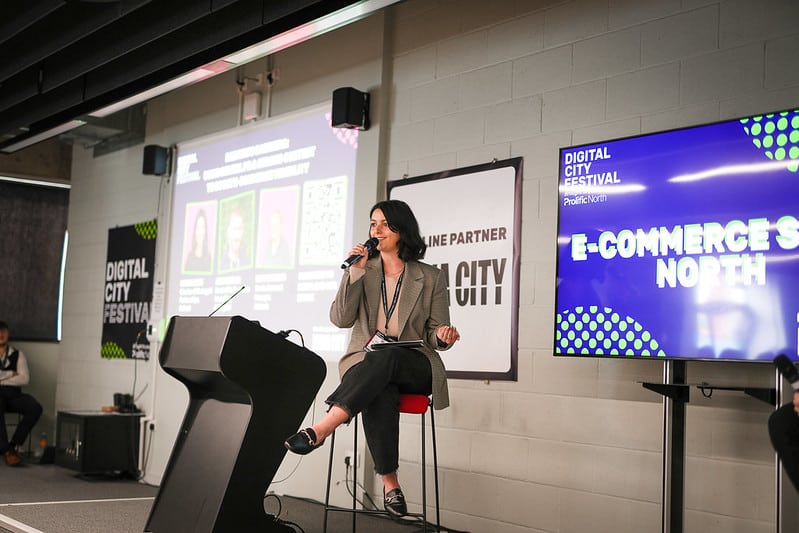
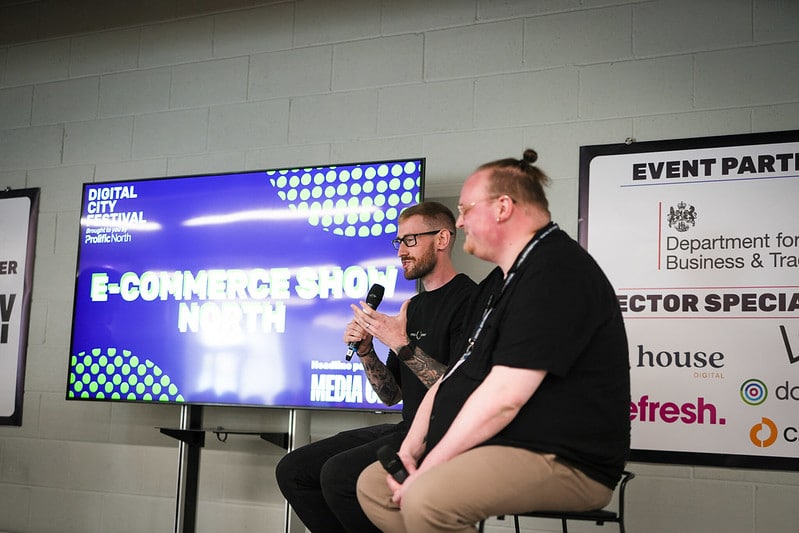
Following an overview of digital PR, Liam Hughes (Refresh) said there’s been a “major change” as it’s now all about quality of links in publications rather than quantity due to Google changes. The quality of links in the right publication means it can build expertise, authority and trust with audiences.
It’s no longer just about “firing out press releases in the hope of getting a link now, it’s all about building a voice and trust,” added Lucy Moore (Refresh). Digital PR has “changed completely”, agreed Ash Winder (CTI Digital).
From crafting infographics, research tools or interactive maps, valuable content is more likely to be picked up by publications added Hughes (Refresh). “The key is why are you creating content and why does someone want to read or use it.”
Winder (CTI) said it “may sound basic” but business objectives need to aline with marketing or other objectives. Other key words of advice came from Hughes (Refresh) who said brands need to remain patient and consistent with link building. Moore (Refresh) agreed, adding “patience is key” as ecommerce brands with the best return are those that invest in long-term digital PR campaigns, not just looking for quick wins.
Navigating the top trends shaping the future of email marketing, Luke McCreery, Enterprise Account Executive at dotdigital, followed with a talk exploring data, personalisation and hyper-targeting, the focus on sustainability and social responsibility, and more on understanding AI and machine learning (ML).
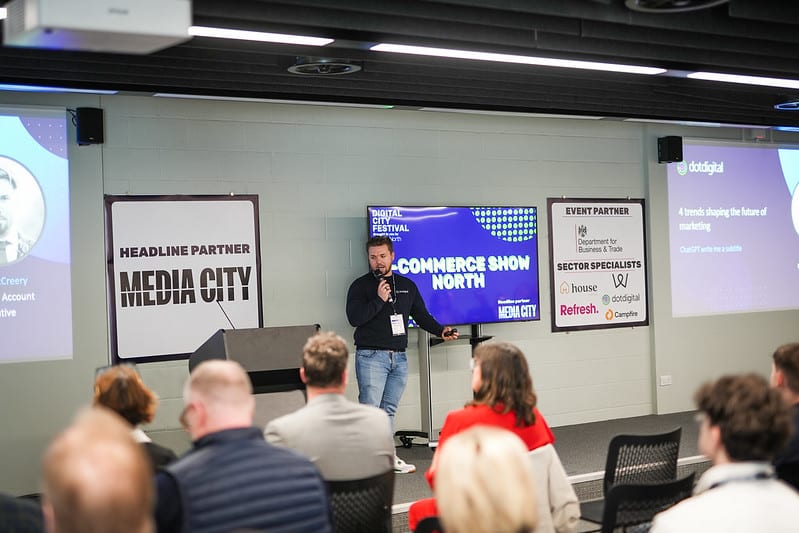
On the top four trends, he firstly urged the importance of being serious about data. There are lots of challenges and constraints with data as many brands are sat on unstructured data, often siloed across various platforms. With an overview of data types, from zero party to third party, he highlighted the importance of brands collecting and unifying the right data.
The second top trend was on personalisation and hyper-targeting, as 71% of customers now expect personalised interactions with companies with 76% disappointed when they don’t receive it. Whether it’s using names in emails or more dynamic content elements by establishing personal connections via annual rewards, brands need to ensure messaging reaches consumers when it matters.
Understanding AI and machine learning was the third trend, as AI can turn preferences, patterns and trends into action. Although developments in AI are happening at a “rapid pace, brands should “embrace AI and ML” to keep on top of competition.
The fourth trend was a major focus on sustainability, with McCreery providing some key tips including growing consumer awareness around sustainable products and practices.
Rachel Birch, Managing Director at House Digital, then took to the stage with a performance marketing take on generative search where she delved into the launch of SGE impacting ecommerce businesses and a fascinating glimpse into how strategies are changing to prepare for the biggest SERP change yet.
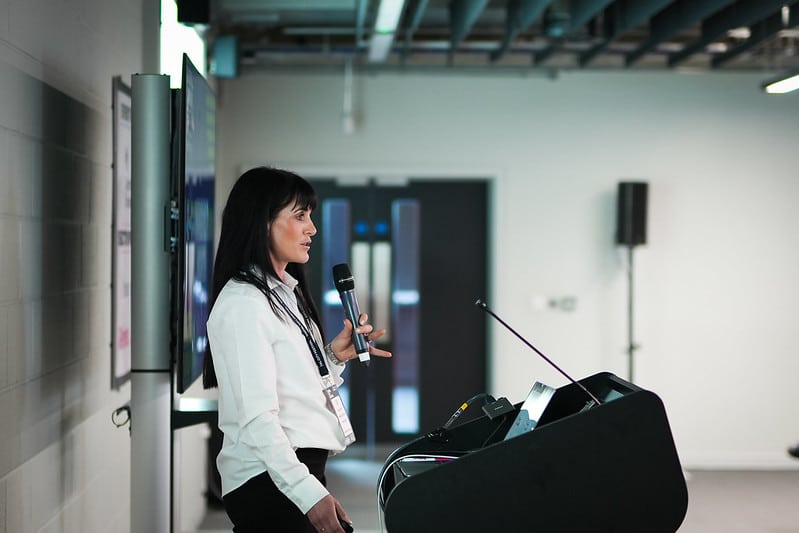
Following an important deep dive into generative search, Birch explained how Google has said it’s a “more interactive way” to search but Google is now shifting away from being a driver of traffic to a keeper of traffic.
It’s going to be a “huge change” and something brands need to get ready for. Exploring research on SGE, recent findings discovered SGE will affect 87% of ecommerce organic traffic yet 43% of SGE sources are not ranking in “old Google” and SGE has replaced featured snippets for 97% of ecommerce queries.
But what does this mean for ecommerce brands? Although she explained SGE is going to “shake everything up” it’s also an opportunity. On how ecommerce brands should respond, she had a number of key points to consider including the feed optimisation in the Merchant Centre to determine eligibility and visibility within organic listings, and optimising websites to showcase experience, expertise, authority and trust to not only rank better but to improve on site conversion rates.
She explored the pros and cons of structured data, explained the importance of targeting ‘follow-ups’ with FAQ content, ensuring rich media such as video and 360 imagery are marked up to secure placements in SGE, plus collating site reviews and user generated content which will be crucial in securing SGE visibility.
Expecting SGE to be in the UK around June or July, she urged the importance of ecommerce brands and marketers to take note and prepare for these changes.
The final session of the day was with John Baines, Digital Trade Adviser at the Department for Business and Trade, sharing valuable insights into how to go global and expand internationally using e-commerce. He was joined by a panel of leaders including Cathy Wallwork, Co-Founder of VIRSEC LTD; Liz Ashall-Payne, Founding Chief Executive Officer of Orcha Health LTD; Irina Shmakova, Export Academy Adviser – MIEx; and Sam Thompson, Senior Enquiries Manager at Export Support Service.
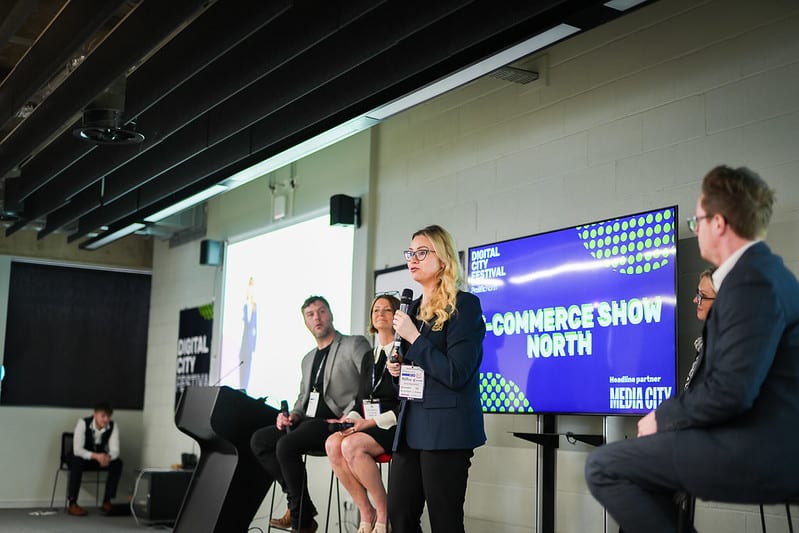

The panel offered expert advice on the support available to ecommerce businesses in the UK to successfully expand overseas, with both Liz Ashall-Payne (Orcha Health) and Cathy Wallwork (VIRSEC) explaining the benefits it has had on their businesses.
John Baines (Department for Business and Trade) said the government is keen for British businesses to understand that there is support in place to help them trade internationally and explained the digital exporting programme is free to join, where businesses can tap into help and advice from a trade consultant.
From the Export Support Service, Sam Thompson said it can help companies with anything from tax liabilities to overcoming regulatory issues in Europe. Over at the Export Academy, Irina Shmakova gave an overview of the free training programme designed to give businesses the “confidence and know-how” to sell overseas.
The panel agreed it’s particularly important to tap into advice when navigating anything from Brexit to visas overseas. Ashall-Payne (Orcha Health) said when thinking about exporting it’s “really important” to consider cultural, market, regulatory and policy fit and that it’s a “marathon, not a sprint”.
“Do your research,” urged Thompson (Export Support Service) as markets can shift and rules can change overnight.
There are plenty of exciting events to look forward to across Digital City Festival week from 15 – 19 April. Make sure you keep up to date with what’s happening across Digital City Festival’s what’s on page here.
Headline Partner
Education Partner
Event Partners and Supporters



